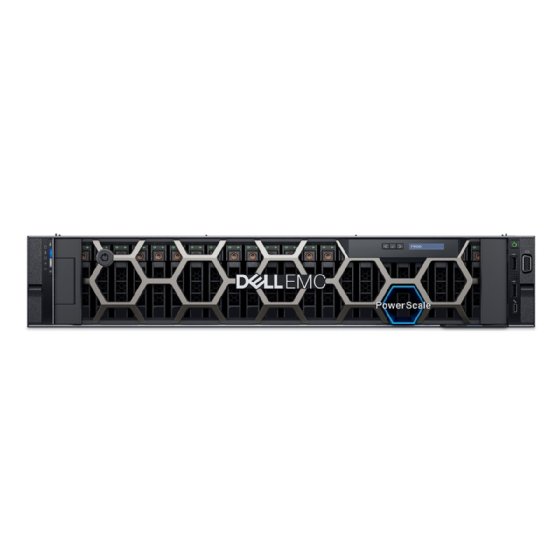
Alexandr Mitiuc - Fotolia
Dell EMC PowerScale adds all-NVMe, Nvidia GPUDirect options
A Dell EMC PowerScale update adds a high-end all-NVMe F900 model with Nvidia GPUDirect support for AI and analytics workloads plus a OneFS 9.2 upgrade to improve performance.
Dell Technologies directed its focus on demanding AI, machine learning and analytics workloads with the latest performance- and cloud-centric updates to its PowerScale scale-out NAS and OneFS file system.
The Dell EMC PowerScale family -- formerly known as Isilon -- added a faster new F900 model with all-NVMe flash storage that can scale from 46 TB to 368.6 TB per 2U node and 93 PB of raw capacity across a 252-node cluster. The F900 is the first PowerScale system to support Nvidia GPUDirect to boost performance by bypassing the host CPU and moving data directly into memory using remote direct memory access (RDMA) technology.
Dell claimed the new F900 delivers throughput of up to 6 GB per node, per second and performs 30% faster for sequential reads than the older Isilon F800 model. Company officials attributed the increase to newer multicore Intel Cascade Lake processors, expanded memory and OneFS file system optimizations.
Upgrading to OneFS 9.2 could also help existing PowerScale customers accelerate performance. Dell claimed the updated file system would speed up the PowerScale F600 by 70% and the entry-level F200 by 25% for sequential reads.
Performance drives upgrade for PowerScale customer
The performance improvements are important for customers in need of real-time access to data. Ontario-based Nature Fresh Farms plans to upgrade next week to OneFS 9.2 across the PowerScale F200, H400 and A100 systems that store about 215 TB of unstructured data.
"The performance really caught our eye," acknowledged Keith Bradley, director of information technology at Nature Fresh.
Nature Fresh uses AI, robotics and automation technology to optimize the growing, picking and packing of tomatoes, peppers and cucumbers in greenhouses in Canada, the U.S. and Mexico. The company relies on PowerScale to process and store about 10,000 photographs every hour and archive the video streams of produce that its cameras and robots capture.
Bradley said the AI workloads and robots have maxed out the performance of the F200 on a couple of occasions, so the IT staff is examining in-house fixes. But with Nature Fresh's use of AI expanding, Bradley is also keeping an eye on the F900 as a potential long-term remedy. He said the company's Nvidia servers have been a "game changer" for AI performance, so the new PowerScale GPUDirect storage option presents an intriguing proposition.

Uptick in all-NVMe for AI
Scott Sinclair, a senior analyst at Enterprise Strategy Group, said the increasing interest in and adoption of AI and machine learning and the expansion of business intelligence and analytics are driving an uptick in demand for all-flash and all-NVMe storage for unstructured data. Sinclair expects the trend to extend to GPUDirect storage because of the work that Nvidia is doing to support developers and "all things machine learning."
Steve McDowell, a senior technology analyst and Moor Insights & Strategy, said the new high-end Dell EMC F900 would increase Dell's competitiveness against Pure Storage's FlashBlade and NetApp's AFF models that also support Nvidia GPUDirect for a performance advantage.
"GPUDirect is rapidly becoming a check-box feature for high-end machine learning, exactly where Dell is targeting the F900," McDowell said. "It's significant in demonstrating that Nvidia continues to set the agenda for deep learning."
McDowell said the PowerScale F900 more generally takes aim at the narrow range of "high-value applications" that enterprises in finance, pharmaceutical, manufacturing, retail, and similar industries depend on for operations. The PowerScale F600 also supports all-NVMe SSD configurations, but neither the F600 nor the F900 support NVMe over Fabrics, according to Dell.
New PowerScale cloud consumption options
Also on Tuesday, Dell added new consumption options for its PowerScale file storage, which supports object access through an S3 interface. PowerScale will be available through Dell's new Apex storage as a service that enables enterprises to buy, deploy and manage on-premises storage in much the same way they would in the public cloud.
Customers that prefer to use PowerScale in the public cloud have a new option for all-flash Tier 1 storage with Google at a lower price point, reduced minimum capacity and shorter contract term than the offering that launched in June 2020. Dell PowerScale systems run inside Google data centers for the service. The starting capacity has now dropped to 25 TB instead of the original 100 TB requirement.
Brian Henderson, director of product marketing for unstructured data solutions at Dell Technologies, said Apex and Google Cloud customers choose the performance, capacity and services they need, and Dell determines the PowerScale model based on their selections.
Dell also supports PowerScale in AWS and Microsoft Azure, but the storage does not run natively in their data centers. Colocation provider Faction operates the PowerScale systems in facilities located near the AWS and Azure data centers and uses high-speed interconnects to link into them, Henderson said.
Additional new PowerScale features Dell announced on Tuesday include security updates to support IPv6, external key managers and the Security Technical Implementation Guide configuration standard.
Enterprise Strategy Group is a division of TechTarget.
Carol Sliwa is a TechTarget senior writer covering enterprise storage arrays and drives, flash and memory technologies, and enterprise architecture.








